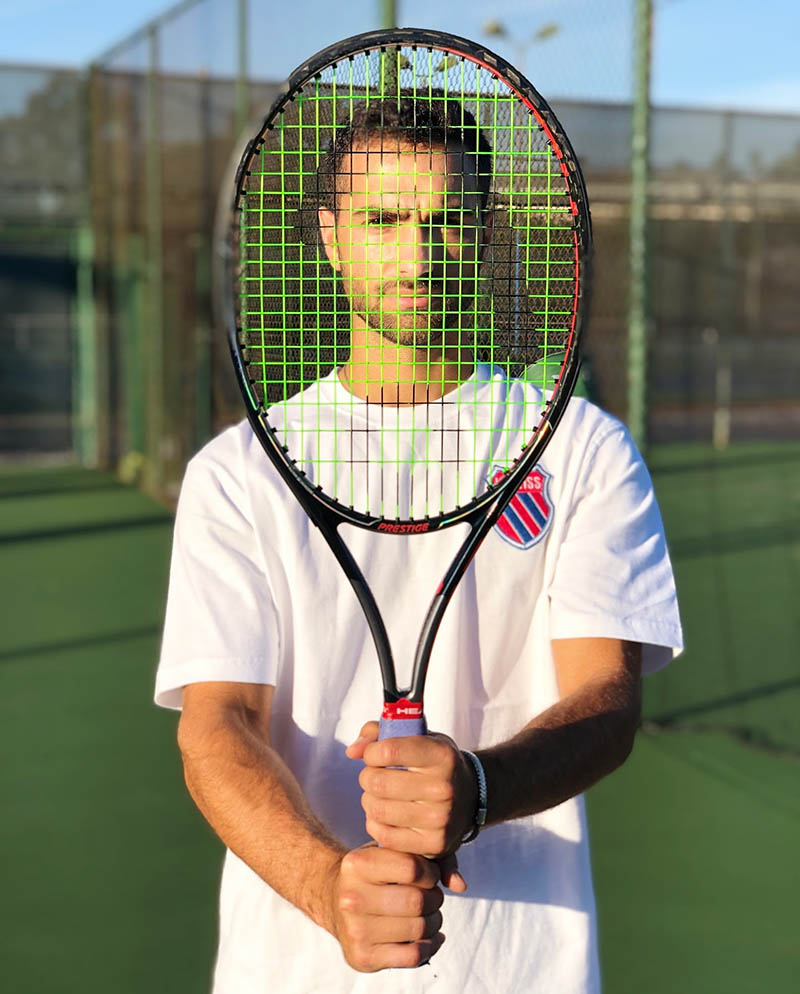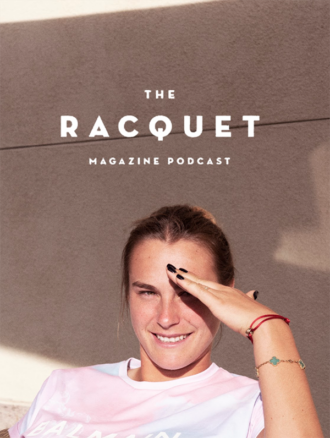By Giri Nathan
This week Wimbledon was canceled. As for the last remaining Slam, the grounds of Billie Jean King National Tennis Center have pivoted to coronavirus relief efforts: This week the indoor training courts are being repurposed to host 350 hospital beds, and Louis Armstrong Stadium is being used to package tens of thousands of meals for patients, workers, and children who relied on public school meals. We are a very, very long way from playing tennis in venues like these. And yet, the players still have to pay their bills. Racquet spoke to Noah Rubin, world No. 225, about how this crisis has felt from a player perspective. This interview has been lightly edited and condensed for clarity.
RACQUET: Take me back to early March. You were playing the Challenger in Indian Wells. What was that like with the rumors of larger cancellations in tennis bubbling? Where were you and what was your thinking at that time?
RUBIN: Ah, worse than that—there were no rumors of cancellation. [Laughs] There were no rumors at all, I think that was the whole shock. Yeah, there were some people talking. I think the Player Council was involved a little bit, but they were probably told not to speak about this topic, and any talk within the tournament did not take place with the rest of the players. So I played four matches, playing pretty well in the Challenger. At that point we knew coronavirus was getting worse but still were naive to think that it wouldn’t affect tennis at all. So I actually remember being at a Korean barbecue restaurant with my team and my girlfriend and I get an email from the ATP saying Indian Wells has been canceled. And it was a complete shock. I think it was one of those days that you’ll remember what you were doing, and how you were feeling. And I looked up and Hyeon Chung was there, former top 20 player with his team, and he was with Soonwoo Kwon, who’s top 100 in the world. I was like, “Is this real?” We kind of thought it was fake, you know? And they’re like, “Obviously.” I was like, this is the craziest thing, and we’re screaming across this restaurant—total disregard for everybody else in it.
So we go from about to play Indian Wells, or getting ready to hear about potential wild cards for myself to…yeah. Even with the cancellation, I didn’t know how serious coronavirus was at that point. My girlfriend and I took a trip to Hawaii because of a $200 round-trip ticket—how do we give that up? So while we’re in Hawaii, we’re hearing from family in New York, we’re hearing from tennis players saying just how bad this could be, and how it’s going to get worse and much worse. And six days felt like six months. And then we got to a point where they were canceling tournaments for months. And here we are now. So it was a long process to get to where we are, and a very scary one. And now I’ve almost come to terms with not playing tennis this year.
RACQUET: Do you think that’s the widespread view among players right now?
RUBIN: I think no tennis until September is probably somewhat rational. But at the same time, tennis has to be one of the last things to go back to normal because of how international it is. Even if you still quarantine the tournaments to just having them in the U.S., you’re still getting players from around the world. So there’s really no winning for tennis. You really have to have a vaccine plus no cases, almost. You can’t just have one part of the world playing tennis—that’s not how this sport works. So it’s a tough situation, and it’s a scary one. Obviously we’ve gotten bigger checks than a lot of other hourly workers, but we’re hourly workers nonetheless. And we go paycheck to paycheck, especially guys outside the top 50 in the world, I would say. Everybody else, there’s guys that are 200 in the world that, six months from now, are going to worry about how rent is going to be paid.
RACQUET: For the majority of tennis players a setback like this can just be financially devastating. How are you planning around that? And do you hope to see something from the tours, some kind of support where possible?
RUBIN: I don’t love patting myself on the back, especially in a situation like this where other people are losing out. But I’ve worked very hard to get Behind the Racquet in a position where I’m really utilizing this time for good, and it’s pushing my projects forward, which hopefully will be a form of income for me eventually, even though I am worried about rent and going into my savings for the next few months. That being said, there are many players that are already looking at rent and saying, “I don’t know how this is going to happen. I don’t know what is going to happen if I don’t play for another six months.” And yeah, are we looking at the ATP for help? Are we looking at tournaments for help? One hundred percent. I think that’s being spoken about at every level. What I want to highlight is, I don’t think there’s any money reserved for players right now. That is not necessarily anybody’s fault. I believe that budgeting is off in certain cases, I believe that they should be helping the players regardless of how this could impact some of the budgeting for the future. They could tell me I don’t know the finances involved, I don’t know how this could affect tennis and the tournaments in 2021. But if you can’t protect the players right now, there’s no point for 2021.
The reason we don’t have a reserve, like other athletes, and why MLB is making so much money that they could even pay minor-league players, is because they built revenue throughout their program. Tennis not being promotable or fan-friendly—all the problems I’ve been talking about for so long have been easily highlighted within this pandemic. Between the lack of communication, the issues with actually having enough revenue to keep this sport alive, this is highlighting them tenfold to a point where you don’t even have to be that educated in tennis to see what’s going on right now. So if anything, I want to use this time. Because you can read any history book, and it’s kind of those worst times where, yes, complete turmoil can take place, but you come out better, you come out evolved, you come out almost on top. And I’m worried that tennis will come back to a place where it’s worse off than we were before. This is a time where people are answering emails and calls quicker than ever, because we’re all home. How can we use this time so we can look back five years from now and say, “Wow, good for us for taking that chance and using this time because look where tennis is right now. I mean, we really evolved, we really got to a place where it’s one of the top sports in the world, and it’s only growing.” But right now, I see us being way more reactive than proactive. And it’s going to hurt us.

RACQUET: Is there a top priority on your mind, a concrete takeaway that you hope tennis has from this crisis?
RUBIN: I have probably a billion and one. I’m talking to lawyers, I’m talking to a thousand players, I have WhatsApp groups with 150 players in it, I’m talking to the heads of ATP, I’m talking to World Team Tennis, everybody, you name it. But if you’re talking about the number-one thing on my list right now, it’s unifying the voices of players. I think this is highlighting how segregated we are, in a way, and how many voices, and how difficult it is to get everybody in the same room. This is highlighted at the tournament level and at the federation level. And that’s fine. But if players are unified, we can get work done. So I think unionization and getting one person to speak on behalf of the players, this is a top priority for us right now. And I think that’s the only way that all the other things can come to fruition—if we’re on similar pages, if we have similar agendas. It’s okay if we disagree on certain points. But, you know, let’s make it possible to at least talk. [Laughs]
RACQUET: We’ve been talking about broader structural stuff. What does it look like for you personally, in terms of staying fit, trying to stay sharp for when tennis does eventually come back?
RUBIN: I guess the silver lining of my injury last year towards the end was it helped me stay home. And I actually moved back to New York, got my own place, and furnished it, which I would have never been able to do, since Verizon basically tells you you have to be home between 8 a.m. and 8 p.m. [Laughs] So the silver lining of that was, I wouldn’t have had this place without that time off. People made fun of me for actually using my basement as a gym; they’re like, “You’re never going to use it,” blah, blah, blah. Here we are now. Obviously they’re like, “Ugh! You suck.”
Now we basically have a full gym downstairs, I’m running outside every once in a while, I’m using my bike, I have a walking/jogging treadmill, I have a full weight rack, I have boxing, I have everything you really need. So I’ve used to the max, as you can imagine, for both my girlfriend and I, so that’s been really great. But it’s sad: I’m not playing tennis at all. There’s people who have private courts and they’re obviously open. But I’m not taking that chance right now. And actually, I kind of look down upon some of the people that are forcing practice right now. You know, we’re talking about social distancing. And tennis, you’re on the opposite side of the court, but there’s really no need to force trying to find public courts right now, or force that interaction and everything that comes with it. I’m telling you that all these people have complained about how long the seasons are. And I’m like, “Now you have an opportunity to sit on your couch. Try that! Stop complaining.” And believe me, I’m missing tennis so much, I’m looking right now on this call at brand-new racquets, and I would love to pick them up. And I understand that we can’t try to live life normally. We’re just not there. We have to appreciate and understand that this is a new time, and we have to get through this together. And I still think there’s too many people—I could speak for New York—that are trying to live life normally, and we just can’t do that.
Listen Now
The Racquet Magazine Podcast with Aryna Sabalenka
Put on your helmets—the Belarusian dynamo joins Rennae to talk tattoos, what she’s learned from her biggest losses, and says that, no, she doesn’t think she hits that hard.



